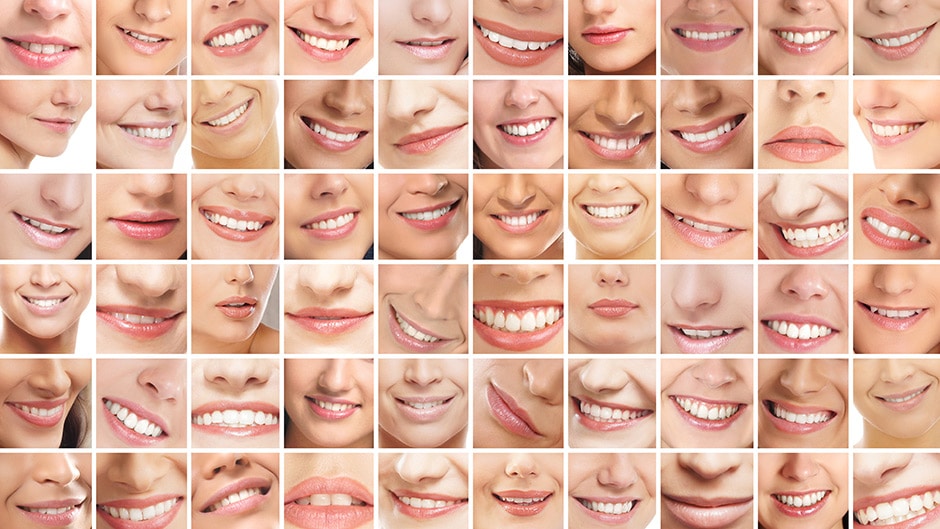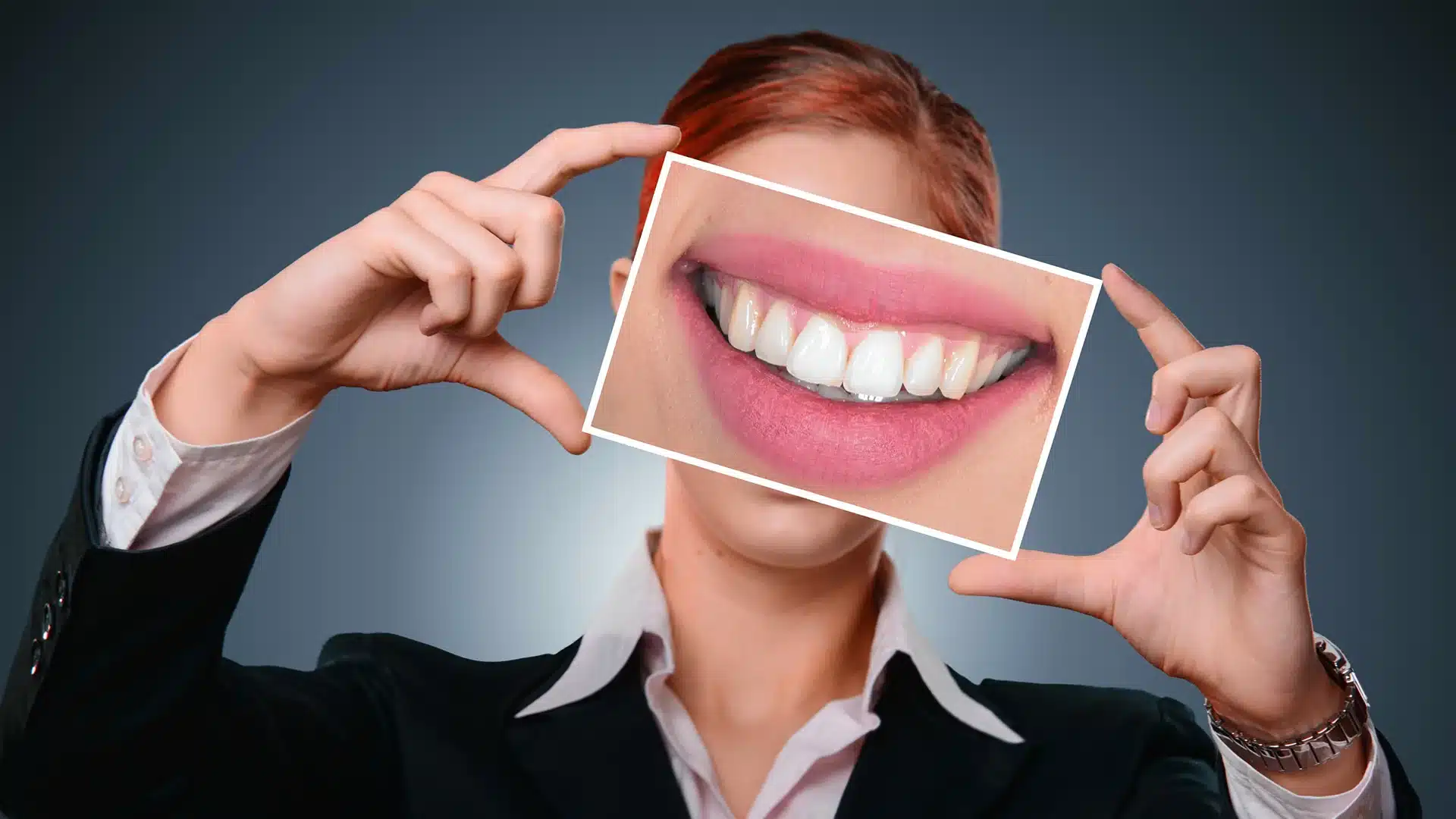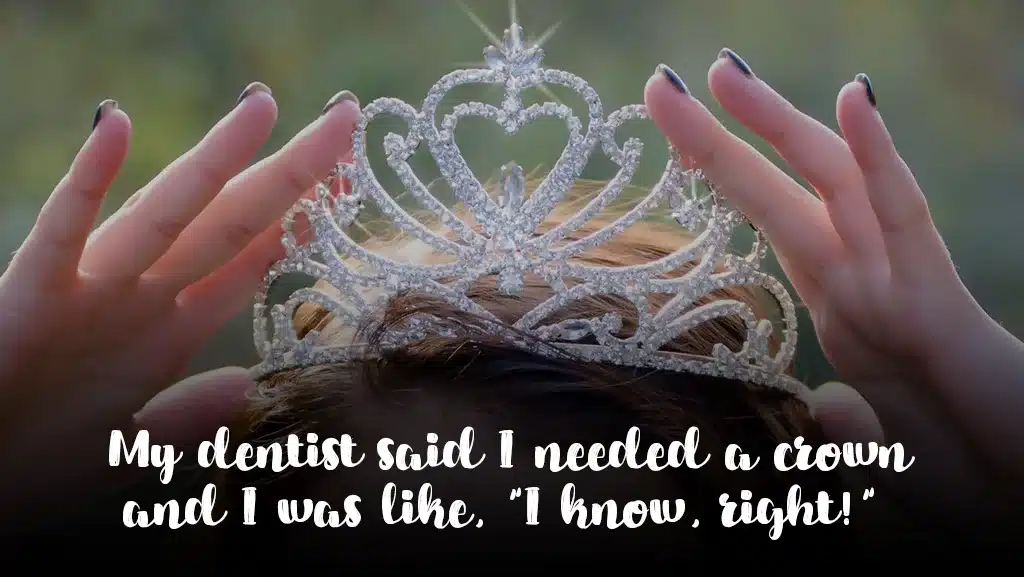A smile (and teeth) are often one of the first things we notice when we meet someone for the first time. After all, they are part of the most prominent facial features just staring us in the face.

In fact, a famous scientist (Doctor of Biological Sciences) named Yarbus (Al’fred Luk’yanovich Yarbus, most famous for work presented in his book ‘The Role of Eye Movements in Vision‘ ) came up with a way to create eye movement recordings of observers exploring a variety of topics. His studies found that when people viewed a photographic portrait of a face, people tend to concentrate attention on the eyes and mouth . . .
Snap judgments and assumptions (and, yes, we all are at least sometimes guilty of judging a book by its cover) are made based on the way someone is dressed, their demeanor, what they say, the way they speak and even on the symmetry and color of their teeth. Assumptions we make can range from personality and intelligence to success, popularity, and even overall health.
We all know one of the best ways to make a great first impression is to smile, but a survey conducted by Kelton Global for the American Academy of Cosmetic Dentistry spells it out noting that 48% of the people they surveyed believe that a smile is the most memorable feature after first meeting someone – more so than the first thing a person says (25%). Furthermore, nothing else even comes close to the impact a great smile can make. Fewer Americans would be likely to remember a person’s clothes (9%) or the way they smelled (8%) after meeting for the first time.
What Makes A Great Smile?

Movies, television shows, and magazine covers all seem to be filled with smiling individuals showing off perfectly straight rows of shining white teeth — an ideal picture we might find ourselves striving to match when we look at our own reflection in the mirror. Popular culture indoctrinates us into believing that having better-looking teeth will improve our lives.
As an interesting side note, while today we view shining white teeth as the ultimate goal, this has not been throughout time and across different cultures. In fact, teeth blackening (or teeth lacquering) was considered the height of fashion and attractiveness at several different points in history: in Southeast Asia up until early in the 20th century, in ancient Japan, and in England during Queen Elizabeth I’s reign.

Queen Elizabeth I, due to her love of anything sweet, had many black teeth. Consequently, women across all society levels emulated her and started blackening their own teeth. Other cultures viewed tooth filing as a sign of maturity. Today, some communities perceive jewel-encrusted dental grills as a sign of prosperity.
In our society today, having a perfect smile, filled with straight, gleaming white teeth is at the top of many individuals’ wish list. As a result of this high demand, the world of cosmetic dentistry has hit the big time, second only to makeup in the nonsurgical beauty industry.
While beautiful pearly whites (or blackened or jewel encrusted teeth) won’t instantly solve all of life’s problems, having a beautiful smile definitely helps. There are several studies which clearly indicate that better-looking teeth can actually improve our lives in many different ways.
As dentists, it is our job to enhance and repair smiles that are both aesthetically pleasing as well as functionally sound. We work hard to carefully diagnose, analyze and deliver the best treatment options to our patients!
Benefits of A Great Smile

One aspect of our lives that a healthy smile improves deals with love and dating. Studies show that those who have a beautiful smile are more likely to get a date in the first place. In fact, teeth make such a strong impression that many individuals say they would not go on a second date with someone who has crooked teeth.
Those same beautiful teeth make us look younger, which is also a desirable trait in the dating world. Those who are looking for love are often looking at your teeth (whether they realize it or not)!
Our teeth also affect the level of success we achieve (or are perceived to achieve). Individuals with straight, white teeth are viewed as being more successful overall. In this study, 45% of all Americans believe that those individuals with straight teeth are more likely to be hired over other individuals possessing a similar level of experience and skill set but who have crooked teeth. They are also seen as 58% more likely to be successful, as well as 58% more likely to be wealthy.
In fact, overall, adults are concerned that a less than perfect smile will affect their ability to find a well-paying, productive job. Additionally, an improved smile can also lead to increased financial gain, as many Americans believe that promotions and raises are more often granted to those with a beautiful smile.
According to research conducted by Dr. Anne Beall, a social psychologist and market research professional on behalf of the American Academy of Cosmetic Dentistry (AACD), a beautiful smile will make you appear more intelligent, interesting, successful and wealthy.

Two sets of photos of 8 individuals (with each set showing 4 individuals before cosmetic dentistry and four after treatment) were shown to 528 Americans and respondents were asked to quickly judge the 8 people based on a set of 10 characteristics. They were not told they were looking at dentistry in particular, but were asked to make snap judgments, rating each person on a scale of one to ten. While the increase in ratings was most dramatic for attractive, popular with the opposite sex, wealthy and successful in their career, the ratings increased in all areas:
| Characteristic Average | “Before” | “After” | Increase |
| Attractive | 4.6 | 5.9 | 1.3 |
| Intelligent | 5.9 | 6.5 | .6 |
| Happy | 6.2 | 6.8 | .4 |
| Successful in their career | 5.8 | 6.7 | .9 |
| Friendly | 6.3 | 6.8 | .5 |
| Interesting | 5.4 | 6.1 | .7 |
| Kind | 6.0 | 6.4 | .4 |
| Wealthy | 4.9 | 5.9 | 1.0 |
| Popular with the opposite sex | 5.0 | 6.2 | 1.2 |
| Sensitive to other people | 5.6 | 6.1 | .5 |
While good oral health is clearly beneficial to our overall physical health, it is also true that others around us see shiny white teeth as a sign of good health. Studies say that rows of straight white teeth are often perceived as a genetic trait of good health. As we age, our teeth naturally turn more yellow as the enamel wears away. They also become more stained due to diet, medications, and smoking (for some individuals). Therefore, it is only natural that we view white teeth as a sign of health, and even vitality and youth, in those we meet. Who would not want to be seen as healthy, vital, and young?
It may come as a surprise (or maybe not), but a smile filled with stunning teeth greatly affects our emotional well-being as well. A study conducted by Salvatore Settineri, Amelia Rizzo, Marco Liotta, and Carmela Mento, published in 2017, showed a clear connection between our teeth and our emotions. In the study, patients with an average total oral health score often reported increased feelings of anxiety, depression, and confusion while patients with a lower than average total oral health score often reported feelings related to fatigue and aggression. The study concluded that individuals receiving dental treatment to increase their oral health (ultimately resulting in straighter, whiter teeth) are likely to experience improved emotional, physical, and psychosocial well-being.
So having a beautiful smile is not strictly a vanity issue, it actually has positive psychological effects. It is not simply propaganda being pushed by individuals looking to make some big money from unhappy individuals. While that may be the aim of some, it is definitely not true of most of us involved in dentistry.
By and large, the dental profession is made up of men and women wanting to improve the lives of our fellow human beings by providing all the new and innovative methods available to provide straight teeth and shining white smiles. We are learning more and more about how improving that smile improves multiple aspects of our daily lives.
Smile Insecurities

Do you feel insecure about your teeth? If you do, you’re not alone. According to a study cited in this NY Post article, “57 percent of Americans cover their mouths when they laugh due to insecurity over their teeth — and one in two will always often try to smile with their mouth closed. Young adults are even more uneasy when they laugh seeing as 62 percent of people ages 25-44 cover their mouths whereas only 20 percent of people 45 and up do the same.”
Self-esteem is a buzzword constantly batted around as a necessary ingredient for a happy, successful life. Having a positive self image (and helping to create that in our children) is an increasingly high priority in our society. A beautiful smile is a big boost to the self-esteem, creating individuals that are more confident, self-sufficient, and outgoing.
These individuals smile more, socialize more, participate in more group and public activities, start up conversations, and are more willing to take on public speaking. They are also less likely to suffer from social anxiety issues, a problem being faced by more and more of our adolescent population. Children experience less bullying and negative peer pressure, also leading to a more positive self-esteem. Isn’t that something we all want for our children, and ourselves?
We can’t forget that ever-important first impression. As the saying goes, you only have one chance to make a good first impression. That beautiful smile is definitely an asset, as it truly helps you make that positive first impression on everyone you meet. That upbeat initial impression is so strong that almost 75% of all Americans say they would trust someone with a nice smile over anyone else, including those with good paying jobs, or driving the hottest car.
We remember those individuals we met who had an attractive smile longer than those individuals we met who had a less attractive smile. The lesson here seems to be that if you want people to remember you, you need to smile and show off those beautiful teeth.
Luckily for us, we live in an age when it has never been easier to get that perfect smile. From invisible braces, veneers, and dental bonding to readily available whitening products and professional dental whitening, a perfect smile is not far away.
Smiling More Often

Individuals with beautiful teeth are more willing to smile. Smiling in and of itself provides many positive benefits and can actually relieve stress and improve overall happiness.
Every time we smile, our bodies release serotonin and endorphins. Serotonin acts as an immune booster while endorphins lower blood pressure, resulting in less stress on the heart. So, not only does smiling make us healthier, together, the serotonin and endorphins make us feel happier. The result is the same if the smile is fake, so, the next time you are feeling stressed, make it a point to smile at those around you. You will feel those stress levels easing off.
Additionally, we view others who smile as more approachable and more likable. Smiling is contagious, we can’t help but smile ourselves when we are around others who are smiling. So people who smile more cause people around them to smile more.
While some may say that wanting a beautiful smile is simply a sign of vanity, there are true overall health and psychological benefits to be gained for ourselves and for those around us.

So really, we dentists are working hard every day to make the world a happier place. 🙂
Are you smiling enough?!
If not, practice makes perfect!
I know I wouldn’t want to live in a world with no smiling. What a sad, sad place that would be.

- Ron Gutman: The hidden power of smiling (TED Talk)
- A Picture Perfect Smile: The Secret to Attractiveness at Any Age
- America’s obsession with perfecting its teeth
- The Average American Laughs 8 Times a Day, Study Finds
- AACD First Impressions (PDF)
- Study Reveals Keys to Memorable First Impressions
- Principles of smile design




